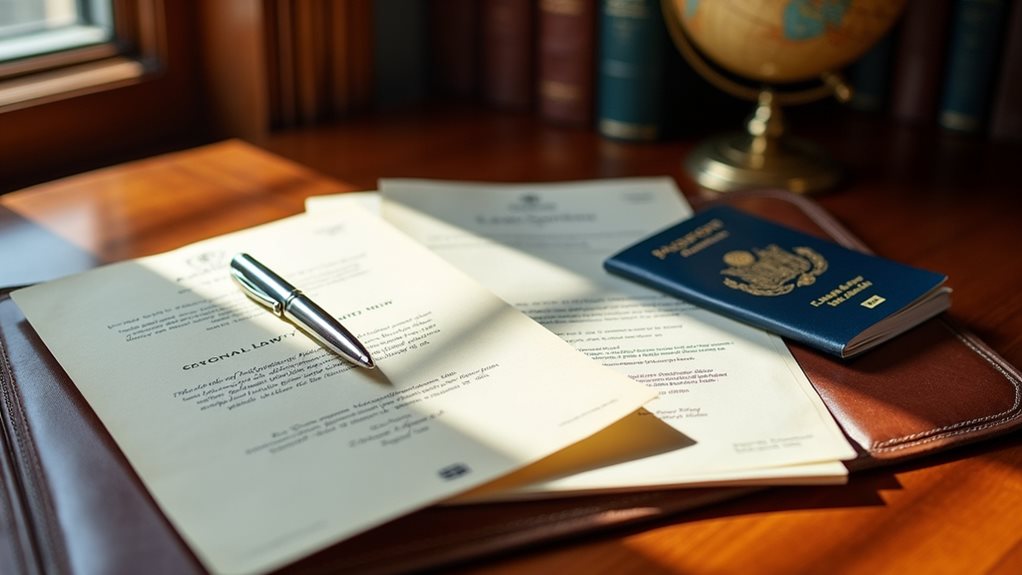To register as a foreign lawyer in the UK, you’ll need to verify your current qualifications and guarantee your jurisdiction’s recognition by the Solicitors Regulation Authority (SRA). You must prove English language proficiency and complete the Qualified Lawyers Transfer Scheme (QLTS), which includes multiple-choice tests and clinical examinations. After gathering required documentation and references, you’ll submit your application through the SRA portal. The process demands careful attention to detail, but understanding each step makes your path clearer.
Understanding Your Current Qualification Status

Before commencing your journey to register as a foreign lawyer in the UK, you’ll need to thoroughly understand your current qualifications and how they align with British legal standards.
Having a clear grasp of your existing credentials will help streamline the qualification evaluation process and identify any potential gaps in your legal education.
Understanding your current qualifications is crucial for identifying educational gaps and expediting the evaluation process for foreign legal registration.
Start by gathering extensive documentation of your law degree, professional certifications, and practicing licenses from your home jurisdiction.
You’ll need to determine whether you’re qualified to practice law in your current location and verify the duration of your practical experience.
The Solicitors Regulation Authority (SRA) will assess these credentials to determine your eligibility for practicing in the UK, so it’s essential that you maintain detailed records of your academic and professional achievements. Additionally, you should be aware of the Solicitors Qualifying Examination (SQE)(https://www.sra.org.uk/sqe/) process, which is designed to replace the previous qualification system.
Evaluating Your Jurisdiction’s Recognition in the UK
Understanding which jurisdictions receive recognition in the UK forms a critical foundation for your path to practicing law there.
You’ll need to conduct a thorough jurisdiction analysis to determine if your current qualifications align with the UK’s recognition criteria. The Solicitors Regulation Authority (SRA) maintains specific requirements for lawyers from different legal systems, with varying pathways depending on whether you’re from a common law or civil law background.
First, check if your jurisdiction has an existing agreement with the UK legal system.
You’ll find that some countries benefit from streamlined recognition processes, while others require additional steps.
Don’t assume that your current credentials will automatically transfer – even if you’re from another English-speaking country, you’ll need to verify your specific jurisdiction’s standing.
Meeting the English Language Requirements
While practicing law in the UK requires deep legal knowledge, demonstrating strong English language proficiency stands as a fundamental requirement for foreign lawyers.
Strong English language skills are essential for international attorneys seeking to practice law in the United Kingdom.
You’ll need to prove your command of English through recognized language proficiency tests like IELTS or TOEFL, typically requiring a minimum score that demonstrates advanced competency.
Some alternative language certifications may be accepted if you’ve completed your legal education in English or practiced in an English-speaking jurisdiction.
The Solicitors Regulation Authority (SRA) generally accepts evidence of English language skills if you’ve practiced law in English for at least two years.
You’ll need to submit detailed documentation supporting your language qualifications, including transcripts, test scores, or employment records that verify your professional use of English.
Completing the Qualified Lawyers Transfer Scheme (QLTS)

To qualify for the QLTS, you’ll need to verify your status as a qualified lawyer in a recognized jurisdiction and demonstrate your legal expertise through rigorous assessments.
The assessment process consists of multiple components, including the Multiple Choice Test (MCT) and the Objective Structured Clinical Examination (OSCE), which test your knowledge of English law and practical legal skills.
Before submitting your QLTS application to the Solicitors Regulation Authority (SRA), you’ll want to thoroughly prepare using specialized study materials and consider enrolling in preparatory courses offered by accredited providers.
QLTS Eligibility Requirements
Before pursuing the Qualified Lawyers Transfer Scheme (QLTS), foreign lawyers must satisfy several key eligibility criteria established by the Solicitors Regulation Authority (SRA).
You’ll need to demonstrate that you’re qualified to practice law in a recognized jurisdiction outside of England and Wales. The SRA conducts a thorough qualification comparison to guarantee your legal education meets their standards.
You must hold a law degree or equivalent qualification from your home jurisdiction and provide evidence of good standing with your local bar association.
Additionally, you’ll need to prove your English language proficiency through recognized tests like IELTS or TOEFL.
The SRA also requires you to submit detailed documentation of your professional experience and character references to verify your suitability for practice in the UK legal system.
Preparing for QLTS Assessments
Once you’ve met the eligibility requirements, preparing for the QLTS assessments demands a strategic and thorough approach.
You’ll need to familiarize yourself with both the Multiple Choice Test (MCT) and the Objective Structured Clinical Examination (OSCE), which test different aspects of legal knowledge and practical skills.
Start by gathering extensive preparatory resources, including practice questions, study guides, and previous examination materials.
Your assessment strategies should incorporate regular mock tests to simulate exam conditions and identify areas needing improvement.
Consider enrolling in specialized QLTS preparation courses, which can provide structured learning and expert guidance.
You’ll want to focus particularly on areas of English law that differ markedly from your home jurisdiction, ensuring you understand both theoretical concepts and their practical applications in the UK legal system.
QLTS Application Process
When applying for the QLTS, you’ll need to follow a structured application process through the Solicitors Regulation Authority (SRA).
You’ll first submit your eligibility application, including proof of your legal qualifications and good standing in your home jurisdiction. Once approved, you can register for the assessments through Kaplan QLTS, the official assessment provider.
Your QLTS preparation resources should include both official study materials and supplementary guides.
Consider joining study groups and utilizing online practice tests to enhance your qlts exam strategies. You’ll want to create a detailed study schedule that covers all assessment areas systematically.
The application process requires careful attention to deadlines and documentation requirements, so maintain a well-organized timeline.
Gathering Required Documentation and References
Successfully registering as a foreign lawyer in the UK requires compiling a detailed documentation package that meets the Solicitors Regulation Authority‘s stringent standards.
You’ll need to begin by creating a thorough document checklist that includes certified copies of your law degree, professional qualifications, and proof of good standing from your home jurisdiction.
It’s crucial to obtain references from at least two qualified legal professionals who can attest to your character and competence. These reference sources should be individuals who’ve supervised your work or collaborated with you professionally.
Your documentation must be translated into English by a certified translator if it’s in another language.
Make sure you maintain digital copies of all submissions and organize them according to the SRA’s specific requirements for easy reference during the application review process.
Applying for SRA Recognition and Registration
The formal process of obtaining SRA recognition begins with submitting your thorough application through their online portal, accompanied by the required registration fee.
During the SRA application process, you’ll need to demonstrate your qualifications and compliance with foreign lawyer requirements in the UK legal system.
- Submit detailed documentation of your legal education, professional experience, and current standing in your home jurisdiction.
- Complete the character and suitability assessment, including disclosures of any disciplinary actions or criminal records.
- Provide evidence of your English language proficiency through approved testing methods or academic qualifications.
Once you’ve submitted your application, the SRA will review your materials and may request additional information.
You’ll receive updates through the online portal, and the review typically takes several weeks to complete depending on your application’s complexity.
Obtaining Professional Indemnity Insurance

Professional indemnity insurance represents an important requirement for foreign lawyers practicing in the UK, protecting you against potential claims arising from professional negligence or errors.
You’ll need to evaluate different insurance types and select coverage limits that adequately safeguard your practice.
When securing your insurance, you’ll want to examine policies that offer thorough protection against client disputes, documentation errors, and breach of confidentiality claims.
Most insurers will require detailed information about your practice areas, client base, and revenue projections to determine appropriate coverage levels.
While minimum coverage requirements vary, it’s vital to assess your risk exposure and choose limits that reflect your practice’s scope.
You should also review policy exclusions carefully to guarantee you’re adequately protected for your specific legal services.
Joining the Law Society and Professional Networks
As a foreign lawyer in the UK, you’ll find that joining the Law Society opens doors to invaluable networking opportunities, professional development resources, and exclusive member benefits.
You’ll gain access to specialized training sessions, industry publications, and career support services that can help you navigate the UK legal landscape more effectively.
The Society’s regular networking events and conferences let you connect with fellow practitioners, build meaningful professional relationships, and stay current with the latest developments in your practice area.
Law Society Membership Benefits
Membership in Britain’s Law Society opens doors to valuable professional development opportunities and networking resources you won’t want to miss.
As a member, you’ll experience considerable membership value through exclusive access to professional resources and networking advantages that can advance your legal career in the UK.
- You’ll gain priority access to specialized training programs, conferences, and workshops designed specifically for international lawyers practicing in Britain.
- You’ll receive regular updates on legal developments, regulatory changes, and practice management guidance through member-only publications and online resources.
- You’ll connect with a diverse network of legal professionals through mentorship programs, regional meetings, and special interest groups that focus on cross-border practice areas.
The Law Society’s benefits can considerably enhance your professional growth and integration into the UK legal community.
UK Legal Network Events
Joining the UK’s vibrant legal network events can transform your career trajectory and professional connections.
You’ll find opportunities to engage with senior practitioners, legal innovators, and fellow foreign lawyers through targeted networking strategies at Law Society functions, regional bar meetings, and specialized practice area conferences.
To maximize your event participation, it’s crucial to research upcoming gatherings that align with your practice area and career goals.
Consider joining specialized legal groups within your sector, whether it’s corporate law, intellectual property, or cross-border transactions.
You’ll want to prepare concise introductions that highlight your unique international perspective and areas of expertise.
Don’t forget to follow up with new connections through LinkedIn and professional correspondence, demonstrating your commitment to building lasting relationships within the UK legal community.
Professional Development Opportunities
Through active participation in the Law Society and professional networks, you’ll gain invaluable opportunities for career advancement and specialized learning in the UK legal sector.
By engaging with these organizations, you’ll expand your professional reach while developing essential skills for your legal practice.
- Join the Law Society’s mentorship programs to connect with experienced solicitors who can guide your shift into UK legal practice and share insider knowledge of the profession.
- Attend regular skills workshops focused on UK-specific legal procedures, documentation, and client management techniques.
- Participate in specialized practice area groups within professional networks to stay current with legal developments and build relationships with peers in your field.
These development pathways will strengthen your expertise and help you establish a solid foundation in the UK legal community.
Maintaining Ongoing Compliance and Professional Development
Once you’ve successfully registered as a foreign lawyer in the UK, you’ll need to maintain ongoing compliance with regulatory requirements and pursue continuous professional development.
Your professional journey doesn’t end with registration – it’s essential to stay current with compliance updates and fulfill continuing education requirements. You’ll want to track your CPD hours meticulously, ensuring you meet the annual minimum requirements set by regulatory bodies.
Consider joining professional organizations that offer specialized training and networking opportunities tailored to foreign lawyers.
You’ll find it beneficial to regularly review updates to UK legal regulations and adapt your practice accordingly.
Remember to maintain detailed records of your compliance activities, including attendance at mandatory training sessions and completion of required assessments.
This proactive approach will help safeguard your professional standing and enhance your legal expertise.
Frequently Asked Questions
Can I Practice Law in the UK While My Application Is Pending?
You can’t practice law while your application is pending. Due to strict legal requirements, you must wait for full approval. Working during the application timeline could jeopardize your registration and result in penalties.
What Is the Average Salary for Foreign Lawyers in the UK?
Foreign lawyers in top London firms can earn £100,000+ annually. You’ll find the legal job market offers varying salaries, with experienced foreign lawyers typically earning £45,000-85,000, depending on your specialty and location in the UK.
Are There Quotas or Limits on Foreign Lawyer Registrations per Year?
You won’t face any foreign lawyer quotas or registration limits in the UK. The Solicitors Regulation Authority (SRA) doesn’t impose annual caps on qualified foreign lawyers who meet their registration requirements and standards.
Can I Work Remotely From Abroad After Obtaining UK Registration?
Like maneuvering through murky waters, you’ll need to tread carefully. You can work remotely, but there are legal implications to evaluate, including local jurisdiction rules, tax obligations, and professional insurance requirements.
How Long Does It Typically Take to Establish a Client Base?
You’ll typically need 12-18 months to build a solid client base. Focus on client acquisition strategies like industry events, referral partnerships, and networking opportunities. Stay persistent—your reputation and relationships are key to success.
Final Thoughts
While the path to becoming a foreign lawyer in the UK demands significant dedication and paperwork, you’ll find the process rewarding once completed. Though the requirements are rigorous, including the challenging QLTS and extensive documentation, they’ll ultimately prepare you for success in the UK legal system. You’re not just transferring credentials – you’re building a new professional identity that bridges international legal perspectives and opens doors to global opportunities.


